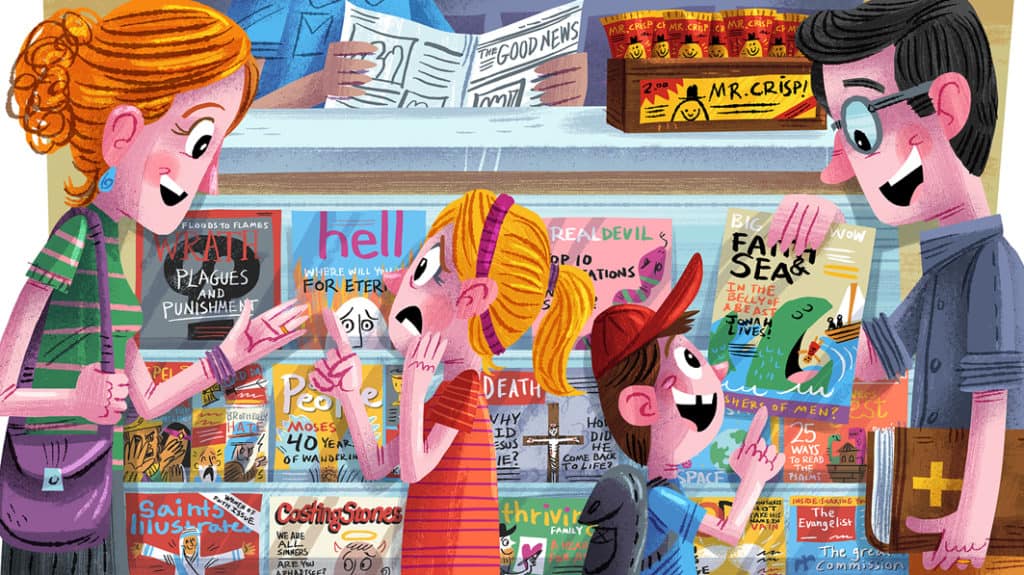
Building a Strong Marriage by Giving Grace
If we want our marriage partnership to be beautiful, meaningful and lasting, then we ought to be living out God’s grace by extending it. And that means building each other up one word at a time.

As parents, you can help your kids grapple with the messiness in Scripture and come to a better understanding of who God is.
It’s easy to look at a lot of Bible stories and imagine them in some sleazy supermarket tabloid:
“War hero vows to sacrifice first thing he sees after deployment. It’s his daughter!” (Judges 11)
“King takes soldier’s wife as his own. Has her husband killed.” (2 Samuel 11)
“Jealous brothers sell their younger brother into slavery, tell father he was killed by wild animal.” (Genesis 37)
The headlines could go on. Rape, incest, homosexuality. Murder and polygamy. It can be difficult to answer our kids’ questions about these troubling scriptural passages. What is the moral? Where is the hero? Can God be both good and in control of this mess?
“The Bible isn’t a book of rules, or a book of heroes,” writes Sally Lloyd-Jones in The Jesus Storybook Bible. “It’s a love story about a brave Prince who leaves His palace, His throne — everything — to rescue the one He loves.”
We need to help our children learn how to read God’s Word — how to understand what’s going on in individual stories and how to frame those tales within the big picture. This isn’t a collection of moral stories meant to inspire us to be better people. Rather, the Bible is a realistic depiction of the condition of the human race. While there are moments of heroism and moral clarity, the Bible isn’t about larger-than-life people making flawless decisions and reaping the reward for their perfection. Humanity has an ugly history, and the Bible doesn’t ignore it, but rather takes hold of it, owns it and gives us a Savior who makes things right.
Help your kids understand that the Bible’s inclusion of troubling behavior does not mean God approves of this behavior. Instead, these stories portray some aspect of humanity’s fallen condition. At times, these stories are troubling, not only because the behavior is so outrageous but also because we aren’t given a tidy outcome. But ultimately there is an outcome. God did not leave humans in their mess. He sent His Son into this world full of sin to rescue us and bring us into His family.
There is hope in these stories. They assure us that God is never surprised by our failure. He has a plan to deal with it. We can remind our kids of Peter, who denied Christ and yet was still welcomed and loved. Or of David, the adulterous murderer described as “a man after God’s own heart.” We can mention Abraham, who forced his wife, Sarah, to lie saying she was his sister and yet is called the father of our faith.
Let’s determine to be honest with our kids about our feelings as we read these Bible stories, but do so in an age-appropriate manner.
Most children in this age range won’t understand the graphic nature of many Bible stories. Those stories are often inappropriate for young children. Let me encourage you to guard their little minds. If they have questions about something you read together or something they’ve heard, point them back to what you know about God.
Tell your kids: Remembering what God is like helps us all the time. God is loving, powerful and wise. Some stories in the Bible are there just to show us how much people need a rescuer. Other stories show us how good God is at rescuing us. People do and say hurtful things, but God is the best at healing and helping.
Children in this age group might be exposed to darker narratives, particularly as they move beyond the lighter version of Scripture found in picture Bibles. While these children are often too young to truly comprehend the awful state of the human condition, you can begin to deal honestly with some of these narratives, with the goal of emphasizing what God is like and what people are like.
Teach your kids that the Bible is not a book about the best people in all of history. The Bible is a true story about how our God pursued some pretty terrible people:
Yes, there are some disturbing stories in the Bible. It is good they are there because they teach us that God’s love and forgiveness are so big that He can take someone who has done something terrible and love him or her into His family. This is good news because we all do stuff that is pretty terrible. Some stories in the Bible are there to show us how great God’s love is, how mighty and powerful He is. Other stories show us how much people need a strong, wise and loving God to come and rescue them.
As your children grow in their understanding of our world, continue to build on the concepts of humanity’s need for a Savior and God’s fulfillment of that need.
Pastor and teacher Bryan Chapell suggests that we ask two questions when studying Scripture. First, “What does this text reflect about the nature of God, who provides redemption?” And second, “What does this text reflect about the nature of humanity, which requires redemption?”
“These [questions] enable us to see that God is holy and we are not, or that God is sovereign and we are vulnerable, or that God is merciful and we require His mercy,” Bryan writes in his introduction to the ESV Transformation Bible. “Christ may not be specifically mentioned in the text, but the reflection of God’s nature and ours makes the necessity of His grace apparent.”
As you wrestle with these stories together, your kids may have doubts. They may wonder if the Bible is true or if God is real. Doubt is not necessarily a sign of distress. Your kids may simply be trying to reconcile what they believe with what they hear in the world. They may resonate with the words of King David as he cried out, “Why, O Lord, do you stand far away? Why do you hide yourself in times of trouble?” (Psalm 10:1). And even Jesus’ disciples had times of doubt. The very people who were closest to the Messiah, who had witnessed His beautiful life and shocking death, couldn’t believe the truth that He had risen!
Teach your kids that doubt does not surprise God, nor does it keep us from experiencing His grace: Jesus asks us to believe in Him, but He also forgives us for the times we don’t. Honest doubt isn’t a bad thing. Jesus isn’t concerned about the strength of your faith; what is important is the strength of the One on whom your faith rests.
As we study Scripture with our kids, we may feel ill-prepared and unsure. But we mustn’t avoid these tough conversations. Guided by faith and love, we help our kids pursue truth, while God provides the grace and wisdom we need.
“Teaching Kids About God’s Big Story” by Michelle Anthony
“7 Ways Your Kids Can Connect With God” by Christie Thomas